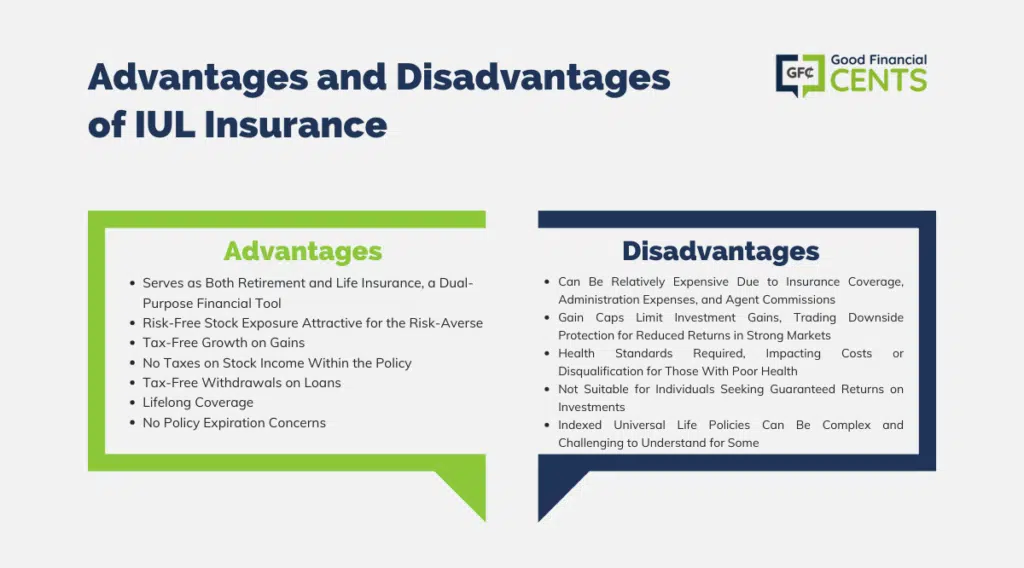All Categories
Featured
Table of Contents
Below is a hypothetical contrast of historical efficiency of 401(K)/ S&P 500 and IUL. Let's think Mr. SP and Mr. IUL both had $100,000 to conserved at the end of 1997. Mr. SP spent his 401(K) money in S&P 500 index funds, while Mr. IUL's cash was the cash money value in his IUL policy.
IUL's policy is 0 and the cap is 12%. Given that his cash was conserved in a life insurance policy, he doesn't require to pay tax obligation!
Iscte Iul Fenix

The many options can be mind boggling while researching your retired life investing alternatives. There are certain choices that should not be either/or. Life insurance pays a survivor benefit to your beneficiaries if you need to die while the plan is in impact. If your household would encounter financial challenge in case of your fatality, life insurance uses tranquility of mind.
It's not one of one of the most profitable life insurance policy investment strategies, however it is one of the most secure. A form of irreversible life insurance policy, universal life insurance policy enables you to select exactly how much of your costs goes toward your fatality advantage and just how much goes into the plan to collect cash money worth.

Furthermore, IULs permit insurance holders to take out fundings against their policy's cash money value without being exhausted as revenue, though unpaid balances may undergo taxes and fines. The primary benefit of an IUL plan is its possibility for tax-deferred development. This implies that any type of earnings within the plan are not exhausted up until they are withdrawn.
Alternatively, an IUL policy may not be one of the most suitable financial savings strategy for some people, and a traditional 401(k) could confirm to be much more advantageous. Indexed Universal Life Insurance (IUL) policies supply tax-deferred development possibility, security from market recessions, and survivor benefit for beneficiaries. They enable policyholders to earn interest based upon the efficiency of a stock exchange index while protecting versus losses.
Pacific Life Iul
Employers might also offer matching contributions, better enhancing your retirement cost savings possibility. With a traditional 401(k), you can reduce your taxable revenue for the year by adding pre-tax bucks from your income, while also benefiting from tax-deferred development and employer matching payments.
Several companies additionally give matching payments, efficiently giving you free money in the direction of your retirement. Roth 401(k)s function in a similar way to their typical equivalents however with one trick distinction: tax obligations on contributions are paid upfront rather than upon withdrawal throughout retirement years (How IUL compares to 401k). This indicates that if you anticipate to be in a higher tax obligation brace throughout retired life, contributing to a Roth account could save money on taxes over time contrasted with spending only with conventional accounts (resource)

With lower management charges generally contrasted to IULs, these sorts of accounts allow capitalists to save money over the long-term while still benefiting from tax-deferred development possibility. Furthermore, lots of prominent low-cost index funds are readily available within these account kinds. Taking circulations before getting to age 59 from either an IUL policy's cash money worth via loans or withdrawals from a standard 401(k) plan can result in adverse tax implications if not dealt with very carefully: While borrowing against your policy's cash money value is usually taken into consideration tax-free as much as the quantity paid in costs, any unpaid finance equilibrium at the time of death or plan surrender might undergo earnings taxes and charges.
What Is The Difference Between Indexed Universal Life (Iul) And 401(k)?
A 401(k) provides pre-tax financial investments, company matching contributions, and possibly more financial investment options. fidelity iul. Consult with a financial organizer to figure out the best choice for your scenario. The downsides of an IUL consist of greater administrative costs compared to standard retirement accounts, constraints in financial investment selections as a result of plan restrictions, and potential caps on returns during solid market performances.

While IUL insurance may prove beneficial to some, it is necessary to understand exactly how it functions prior to purchasing a plan. There are a number of pros and cons in comparison to other types of life insurance. Indexed universal life (IUL) insurance policies supply higher upside possible, versatility, and tax-free gains. This kind of life insurance policy uses permanent insurance coverage as long as costs are paid.
As the index moves up or down, so does the rate of return on the money worth element of your plan. The insurance firm that provides the plan might offer a minimal guaranteed rate of return.

Economic experts frequently recommend having life insurance protection that's equal to 10 to 15 times your annual earnings. There are a number of drawbacks related to IUL insurance plan that critics are quick to direct out. Somebody who develops the policy over a time when the market is executing badly could finish up with high costs repayments that don't add at all to the money worth.
Aside from that, bear in mind the following other factors to consider: Insurer can set engagement prices for exactly how much of the index return you get every year. For instance, allow's claim the plan has a 70% involvement rate (IUL vs 401k tax advantages). If the index expands by 10%, your money worth return would certainly be only 7% (10% x 70%)
Additionally, returns on equity indexes are usually capped at a maximum quantity. A policy might claim your maximum return is 10% annually, despite exactly how well the index carries out. These restrictions can limit the real rate of return that's credited toward your account annually, despite just how well the policy's hidden index carries out.
Iul Illustration
IUL policies, on the other hand, deal returns based on an index and have variable costs over time.
There are several other kinds of life insurance policy policies, described listed below. offers a set advantage if the insurance holder passes away within a collection amount of time, generally in between 10 and three decades. This is among one of the most economical kinds of life insurance policy, along with the simplest, though there's no money worth build-up.
Iul For Retirement Vs 401k
The plan obtains worth according to a dealt with routine, and there are fewer charges than an IUL policy. A variable plan's money worth may depend on the efficiency of certain supplies or other securities, and your costs can also transform.
Latest Posts
Iul Marketing
Equity Indexed Life Policy
Which Is Better Whole Life Or Universal Life